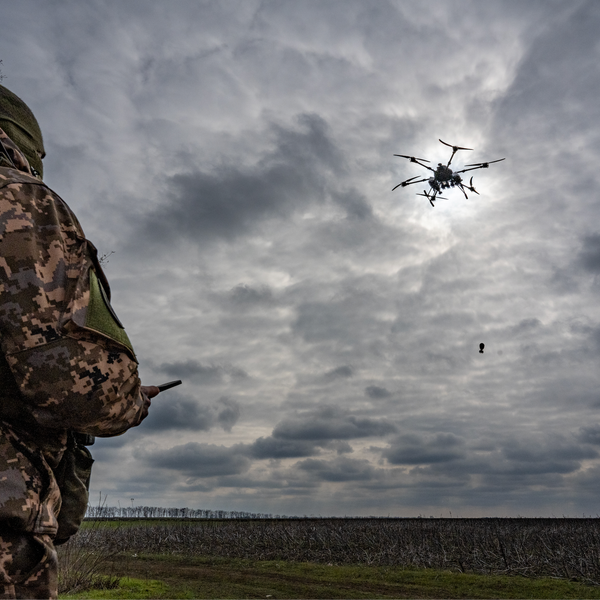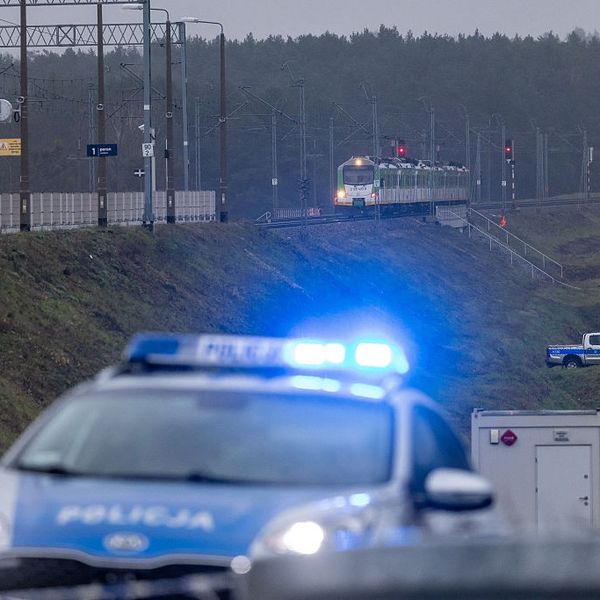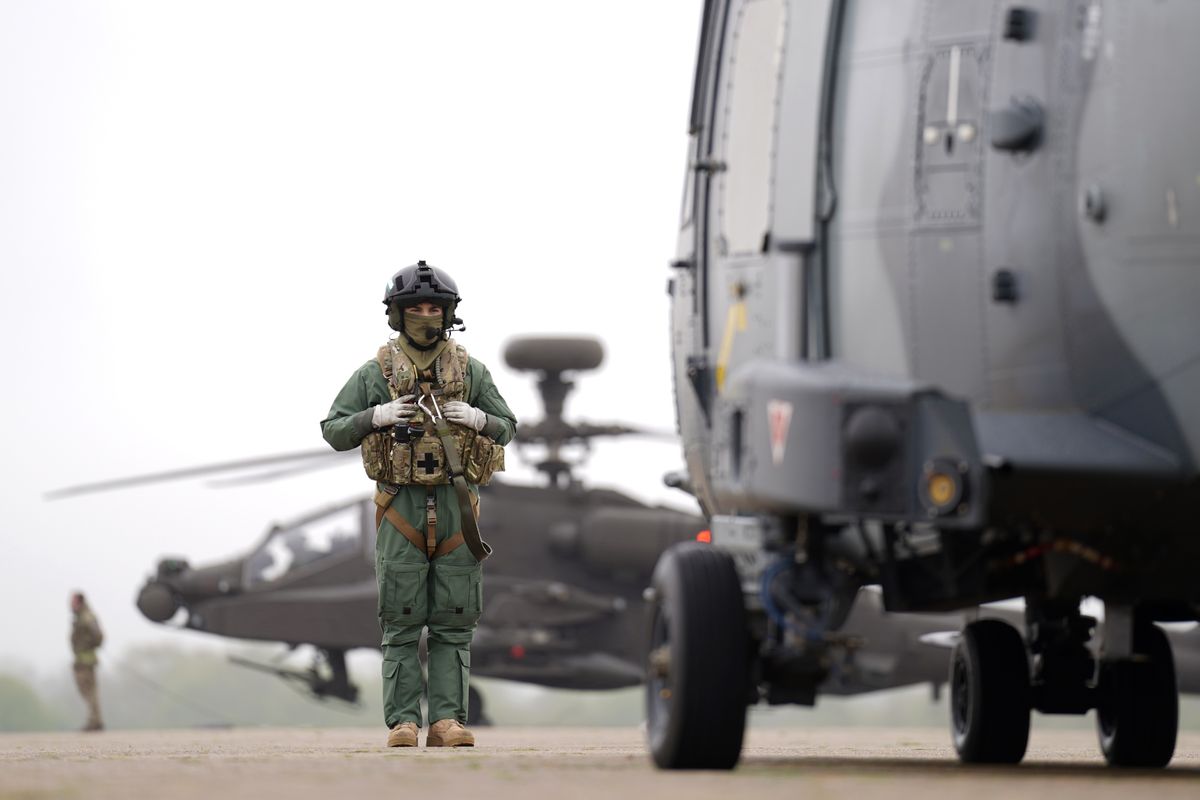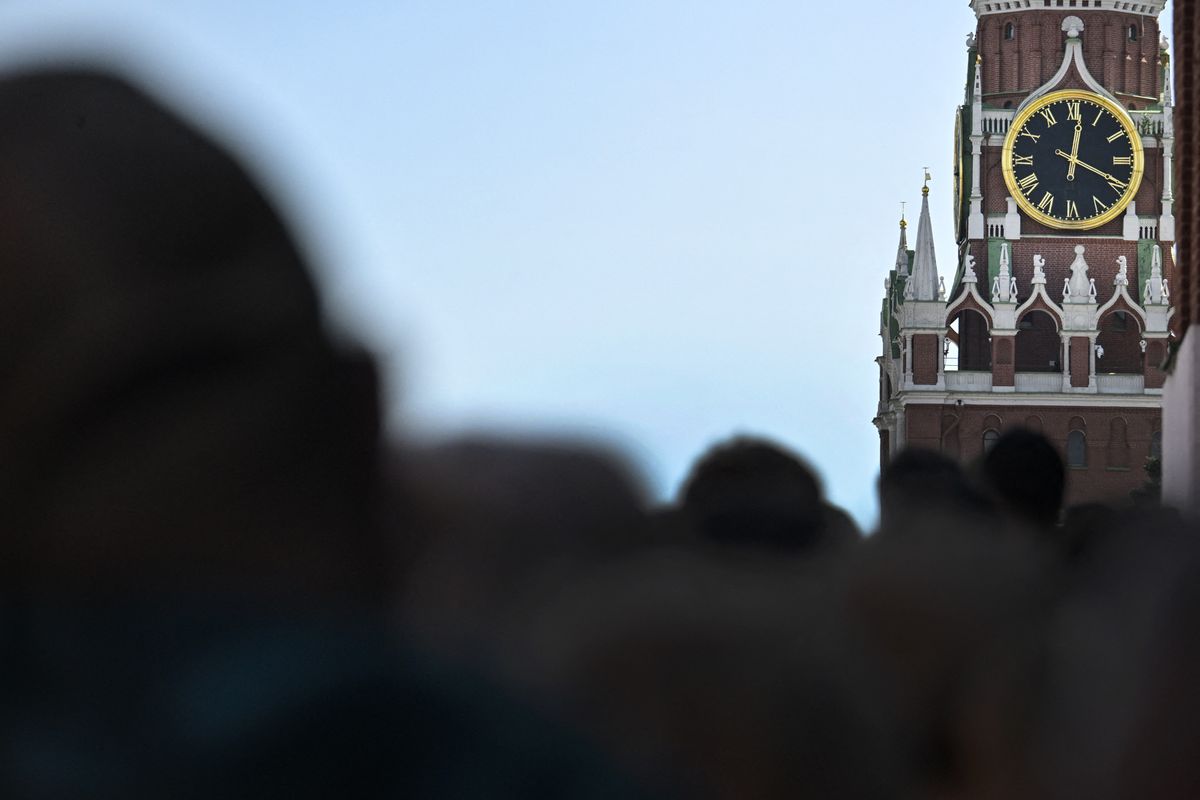EXPERT Q&A – As the Trump administration takes a more conciliatory approach towards Russia, and distances itself in many ways from its traditional European allies, fundamental questions are being raised about the longstanding transatlantic alliance, and the future of Europe. To take two such questions that have been front and center over the past week: When it comes to defense, will Europe have to go it alone? And if the answer is yes – then can Europe go it alone?
The Cipher Brief put these and other questions to Nick Fishwick, a former senior member of the British Foreign Office and member of our expert network.
“If I was in government now, I'd be planning for the worst,” Fishwick said, but he also said that despite President Trump’s unpredictability, he doubts that the U.S. will break completely with Europe. He said he has faith in U.S. policymakers who won’t “want to go rushing off into an abrupt volte-face where suddenly President Putin is our best friend and we don't like the new Prime Minister of Canada. I'm just assuming that's not going to be happening despite rhetoric that comes out of the White House.”
Fishwick spoke with Cipher Brief Managing Editor Tom Nagorski. Their conversation has been edited for length and clarity. You can watch it in full at our YouTube channel.
The Cipher Brief: Even after Donald Trump was elected, did you foresee or imagine that we'd be asking these kinds of questions about the transatlantic relationship – or at least asking them this soon?
Fishwick: Not exactly. But I'd say two things. One is when The Cipher Brief asked me which country we should pay most attention to in 2025, I thought I'd be very clever and say, instead of Russia, China, or Iran, the United States, because changes in the United States were going to set the global backdrop against which other changes in global geopolitics will be played out. To that extent, it was, for me, predictable that changes coming out of DC would reverberate around the world.
But would I have expected Europe to be asking itself questions about going it alone, ever in my lifetime? Certainly I wouldn't have expected that, but again, you've got to go back to this point that what we did expect of the Trump presidency, was the unexpected. We know that he's unpredictable. That is not easy for allies. We are still very close allies. Unpredictability in an ally is not ideal and it's not particularly helpful. But I think it was foreseeable that the questions posed to the Western alliance by Trump 2.0 would be more searching and more difficult than those posed by Trump 1.0.
The Cipher Brief: Different parts of Europe have been pledging greater support for Ukraine, but more broadly, they're saying they’re ready to “go it alone.” Has that surprised you?
Fishwick: No, but I am encouraged by it. The fact that European countries have stepped up is good, including my own country, the UK. However, I think we've got to remember that the United States, whether it's run by Trump or anybody else, has had a very strong point for many years, which is that European countries, including my own, but more so other European countries, have had the luxury of contracting out their security to the United States and enjoying post-Cold War savings dividends.
Defense spending and the size of military forces across Europe have reduced significantly over many years. I was looking at the amount of GDP that the UK devoted to defence in the year that I was born, and it was something like 8.5%; it's now, we hope, going up to 2.5%. That gives you some sense of the perspective of the change over, let's say, 60-plus years.
So I don't blame the American government, whether it's Trump or anybody else, having said for quite a long time, you guys have got to step up. But I am glad that European countries have caught that ball that's been chucked to them. They are committing themselves to stepping up the amount of payment. The Germans have just enabled themselves to ignore their traditional debt ceiling to enable them to spend more on defence. That's a good sign.
Experts are gathering at The Cipher Brief’s NatSecEDGE conference June 5-6 in Austin, TX to talk about the future of war. Be a part of the conversation.
The Cipher Brief: Since you raised Germany, their expected next chancellor, Friedrich Merz, said that his main order of business as chancellor would be to begin to work towards “real independence from the United States.” How important is it for the continent to have that kind of language and leadership from the Germans?
Fishwick: I would say it's important, but I would also caution: We're all thinking about Ukraine. We have been emotionally and practically, in many cases, supporting Ukraine, not only since the 24th of February 2022, but eight years before that, when the Russians started illegal military operations into Ukrainian territory. So we've all basically been behind Ukraine.
But what we've learned is that if a democracy assures another democracy or another country that we're with you forever, that by definition can't be true – because within a democracy lies the ability of the people to go in a completely different direction. The people of America knew that President Trump was determined to go in a different direction over Ukraine. Therefore, it was meaningless for President Biden and anybody else to say, We're with you forever. We can't make guarantees like that, and it's misleading to do so. So we just need to bear that in mind. We are committed to Ukraine, but there are conditions around that support.
Still, it's good that Merz said that, because I think it's sending a good signal to President Zelensky that, if not forever, then at least hopefully for the long term, Europe is going to stay with Ukraine. And Zelensky may well have worried about whether that commitment was going to be there.
The bit that I'm not so comfortable about is statements about going “independent.” I don't want that to happen – ever. I'm not sure it is necessarily going to happen. If I was in the UK government again now, I would be following a strategy of preparing for a U.S. strategic shift, say from Europe to the Asia Pacific, and to causes closer to America's own homeland. But I would also be working as hard as I could to preserve what I could of NATO, of the Five Eyes [intelligence-sharing] relationship, and of all sorts of military cooperation from the United States. Let's remember that we are still completely dependent on lots of forms of military cooperation and assistance from the United States. So I think to talk too blithely about independence is good in getting in the right mindset, but I don't want people to start assuming that we've given up on the relationship with the U.S. For me, that's pretty much close to a worst-case scenario.
The Cipher Brief: Turning to British Prime Minister Starmer, they say moments can make a leader. There’s a lot of talk about what some are even calling a Churchillian moment for the prime minister. Do you think he is doing a good job at the balance you just described – of preparing for a brave new world, if you will, but also trying to maintain the relationship with Washington?
Fishwick: I think his trip to Washington went very well. It was very carefully thought through by the prime minister's team. I think they got it right. If nothing else, it was important that President Trump should clearly have enjoyed the visit. I'm not on the inside, but it seems likely that there were very good conversations between our prime minister and your head of state. So that's good.
At the same time, I know that Starmer and the current leadership of the Labour Party, the current government, are committed to Ukraine. As I say, democratic governments can't promise, they can't use words like forever, but they can use words like “for the long term” or “as long as we're in power.” I'm very confident that this government is committed to Ukraine. And it is clearly thinking about the scenario of less American commitment to Ukraine's long-term security. From what I can see of Starmer, whether you call that a Churchill moment or a Kier Stammer moment, I think he's done well in seizing that opportunity.
It’s an opportunity to respond to the American challenge. It's an opportunity to assure Ukraine. I think there's also an opportunity for us to reposition ourselves constructively with regard to Europe. Britain pulled out of the European Union. We voted against staying in the European Union in 2016. After a few years, we formally dropped out of the European Union. There's a moment here for cooperation with European colleagues over defense, which will be popular in this country. And I think that will pave the way for a new set of constructive relationships between Britain and European Union countries, notably France, Germany, Italy, Spain, but the other countries as well, that will provide a new version of cooperation with Europe that might pave the way for cooperation across a different set of issues. An opportunity to set up new positive relationships with Europe, post-Brexit — I think the Prime Minister's well placed to make the most of that opportunity.
The Cipher Brief: Back to the “go it alone” point, you’ve noted that there are many things that Europe cannot really manage without the United States, at least not right now. What did you have in mind?
Fishwick: Militarily, we've got tens of thousands of American troops in Europe. Please don't go. The longer those guys stay, the less likely our enemy, Russia, is to play games with the borders of European countries.
Secondly, there are issues involving high-grade weaponry on which we are dependent on the United States. I think it's true that Britain and France don't have tactical nuclear weapons. If bad things started happening, and the Russians proved me wrong and did use tactical nuclear weapons, currently we're in real trouble because we don't have a tactical nuclear response. I think the Americans provide that.
There are very close relationships between U.S., NATO, senior military people and obviously European NATO people, and it would be a tragedy to lose that.
There's also the Five Eyes intelligence relationship. We know that the Americans are huge providers of intelligence that are used by the other Five Eyes countries, including the UK. We really don't want to lose that. So it's intelligence as well as military support.
Everyone needs a good nightcap. Ours happens to come in the form of a M-F newsletter that provides the best way to unwind while staying up to speed on national security. Sign up today.
The Cipher Brief: Again, let’s assume the worst – that's a very long term proposition, is it not, to fill those gaps you've just outlined.
Fishwick: I'm assuming that even if the U.S. reorients its strategic priorities, there will remain a very close intelligence relationship between the UK and the U.S. And despite all this nonsense about Canada as the 51st state, which frankly I find bizarre and offensive, I assume that the Five Eyes will survive. So I'm assuming that it's in all of those five countries’ interest — the UK, Canada, Australia, the U.S., and also New Zealand — that the Five Eyes survives, possibly in a slightly different form, if the U.S. is producing less intelligence on on Russia. Perhaps it'll have less to share, but we're still going to need it because I think America is still going to produce high-grade intelligence on Russia and we need access to that.
On the other hand, in terms of going it alone, we've got to remember: the Russian economy is nothing compared to the European economy. The American economy is roughly comparable to the European economy in terms of prosperity, industrial output, GDP and those sorts of things. The difference between the European Union and Russia is massive. Russia's got a very small GDP compared to ours. And they spend about 10% of their budget on military matters. Some people think that is eventually going to lead to a crisis for the Russian economy, some people think Russia can just keep doing it; I don't know the answer to that. But I do know that without having to spend anything like what Russia spends on its defense, if we can't increase what we spend and also use our superior technology for military purposes to keep us safe, then we don't deserve freedom.
Europe will respond. I'm just saying if we don't, it'll be pretty shameful and it'll serve us right. But I don't think that's going to happen.
The Cipher Brief: Can you say, for yourself but also your countrymen, do they view this as a complete rupture or a historical blip, or something in between?
Fishwick: I just don't know, because President Trump is so unpredictable, and I just don't know whether he knows what he's going to do next. But if I was in government now, as I say, I'd be planning for the worst, but assuming, if not the best, then something pretty reasonable — that the intelligence relationship will continue, that military cooperation will continue, that there'll be loads of people in the American administration, the intelligence community and Congress who will continue to share the values that we and our European colleagues share, and not want to go rushing off into an abrupt volte-face where suddenly President Putin is our best friend and we don't like the new Prime Minister of Canada. I'm just assuming that's not going to be happening despite rhetoric that comes out of the White House.
I don't think it's going to be the worst case, but I think it's right to prepare for activities, statements, policies from the United States that are going to be unwelcome. I don't think that we will have to give up on the relationship, but it's unpredictable and we've got to be prepared for bad things to happen.
Read more expert-driven national security insights, perspective and analysis in The Cipher Brief














